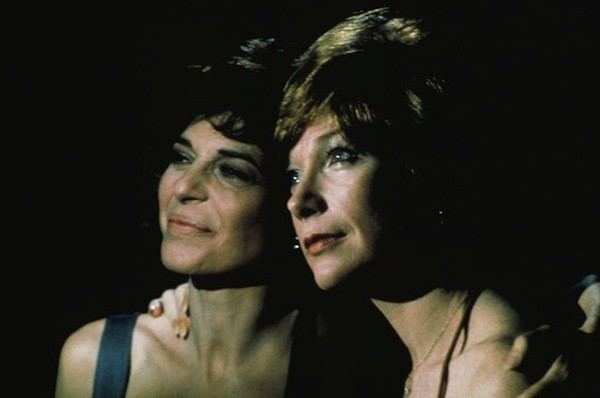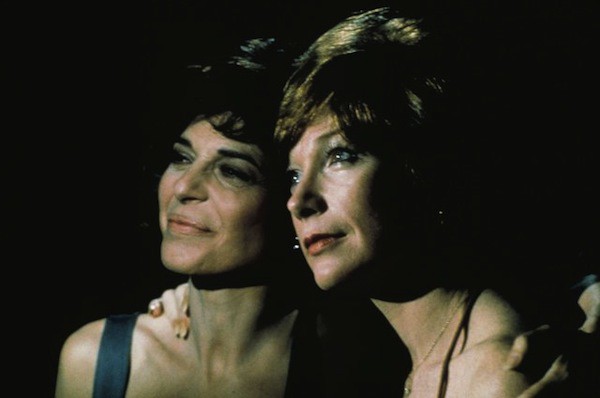My Favorite Catfight: Deedee and Emma in The Turning Point
by Dina Gachman


One of my fondest memories of my best friend is a fight that escalated with me hurling a bottle of Advil at her head, and her firing back by lobbing the TV remote at my torso. We loved each other, but living with your closest friend isn’t easy. As with siblings, you know each other too well to be on your best behavior; you know nothing permanent will be lost if you toss a salt shaker at her because she forgot to wash her dishes for the tenth day in a row. That’s the beauty of true friendship–you can express yourself, and chances are, you’ll apologize and head to happy hour once the dishes are washed and the saltshaker retrieved.
In film, fights between women are usually sexualized (bikini-clad girls mud wrestling and pretending to be mad at each other; boobalicious 1960s Russ Meyer babes pulling hair and rolling around in the desert), or viewed as negative expressions of female envy and pettiness. In her 2003 book Catfight, Leora Tanenbaum writes, “Competitiveness between women is a fact. It has a history and function in American society that does not benefit women.”
She’s right that sabotage benefits no one, but two women fighting with each other doesn’t have to be embarrassing or even negative. Sometimes catfights are cathartic and funny, and I’m not just talking about Kill Bill-style beat-downs. As fun as it is to watch women expertly kicking ass — each others’ asses, too — on screen, what I’m talking about are fights between women who aren’t wielding Hattori Hanzo swords, the ones that feel pleasurably, uncomfortably real.
One of the best cinematic catfights happens in 1977’s The Turning Point, a film in which Shirley MacLaine and Anne Bancroft play lifelong friends who reunite when Emma (Bancroft), a superstar ballerina with the fictional American Ballet Company, comes to perform in Oklahoma City, where Deedee (MacLaine) runs a dance studio and lives with her husband and three kids.
As the movie starts, Emma is single and childless, with just three little dogs and her faltering pride for company; career was her top priority, and the strategy is beginning to fail as she reaches “a certain age.” Deedee, on the other hand, never made it far in the ballet world, having cut her professional opportunities short after getting pregnant by hottie dancer Wayne (Tom Skerritt, the Buddha mentor to Tom Cruise’s Maverick in Top Gun). The film is driven by the grass-is-always-greener longings and resentments working their way into these two women’s friendship — tense, unspoken issues resolved only by the all-important catfight.
What leads up to the breakdown: Emma sees Deedee’s daughter Emilia dance in Oklahoma City and becomes convinced that she’s the next big star. Wayne, a groovy ’70s dude well apprised of women’s liberation, tells his wife to move to Manhattan for the summer while their daughter trains with ABC. Deedee and Emma find themselves together again, watching Emilia and thinking of their past. Tensions boil; the two women love each other enough to think about strangulation. At a gala where they stand on the sidelines watching younger dancers perform, a reverb-heavy voiceover brings back a conversation they had in Oklahoma, reminiscing about the year they split apart:
Deedee: You got 19 curtain calls…
Emma: …and you got pregnant.
Later, when Emilia flits into the room after her triumphant ABC debut, Emma rushes over and bows before her protégé in a deep, adoring curtsey. Deedee, shut out of the moment, stands to the side and glares. Then, after the head of the ballet company (Adelaide, the type of woman who’ll only call you “dearie” if she hates you) drops the bomb that Emma’s officially being demoted, the two friends find themselves in the bar, mutually stewing.
Deedee turns to Emma and starts talking about a fairy tale that she used to read to Emilia. There were princesses, Deedee says, who opened their mouths and watched either diamonds or “newts and hoptoads” fly out. It’s a suggestion, almost an invitation — the two of them are done with diamonds, and the newts are about to go flying. When Deedee calls Emma a “clever little twinkle toes,” things escalate quickly.
Deedee: I suppose if you said bullshit you’d say it in French, wouldn’t you?
Emma: If that word came as naturally to me as it does to you I’d have used it several times by now… in English.
If this were a parking lot brawl in high school, this would be the moment they yelled, “Oh hell no, bitch!” and started pummeling each other on the asphalt. But this is ballet, so instead Emma elegantly tosses a cocktail in Deedee’s face. “Good girl,” says Deedee, her voice full of poison. Then they storm out of the bar with claws extended.
“You’re a user and you always have been, for your whole life!” Deedee yells, sounding less like an ass-kicking warrior woman and more like a sixth-grade wimp, which is probably what most of us sound like in the heat of battle. “Keep your goddamn hands off my daughter!” she screams. Then she shoves Emma, hard.
From there, the action goes full throttle. Emma and Deedee hit and spank each other as the wind whips their pastel chiffon evening gowns through the air. It’s horrible, and also hilarious; I have no idea how to throw a punch, so spanking someone in the heat of the moment sounds pretty realistic to me. Emma screams that Deedee was “too busy screwing her head off” to focus on her career. “You bitch!” Deedee growls as she tries to beat Emma to a pulp with her purse.
You get the sense that these two women have never acted this way with another human being: so enraged, so sad, so embarrassing. The scene distills exactly what some close friendships feel like — the coexistence of resentment and affection, the lightning-quick transition between adoring someone and wanting to hurt them. Unlike so many catfights in film or TV, this one’s relatable: I can’t imagine actually throwing a roundhouse kick at my friends, but spanking them with a sequined clutch after yelling a bunch of hostile, ridiculous nonsense? That, to me, feels real. Especially if the fight is over as quickly as it began, and you’re heading back inside the party together, laughing.
Dina Gachman is a Texan adrift in Los Angeles. Her work has appeared in Forbes, the LA Times, Los Angeles Review of Books, and Marketplace on NPR. She’s on Twitter @TheElf26.